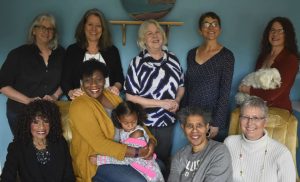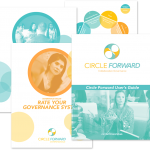Fostering resilience in the Asheville area

photo credit: Nelle Gregory
When Laura Lengnick received an “angel grant” to be invested in women working for sustainability in the local community, she knew just what she’d do. She’d access the wisdom of women leaders age 50 and older to select projects that would foster resilience in the Asheville area.
Laura is well-known for her over 30 years in agricultural and food system sustainability – as a federal researcher and policy-maker, Warren Wilson College teacher of sustainable agriculture, community activist and farmer. “I feel at the peak of my abilities, with a lot of competence, experience, knowledge, in my mid-fifties, and I don’t fit search criteria for any grant program for professional development. So I decided to invest in women fifty and above who are leaders with that kind of experience, wisdom, and intelligence in my own community. I asked them to nominate programs they thought were worthy of funding.”
Laura put out the call to her network and launched
Resilience Women Asheville.

photo credit: Nelle Gregory
Participant Christine LaPorte of Sacharuna Foundation described the women this way: “We’re a powerhouse group, as witnessed by the impactful ways we each work in our communities.”
According to Rev. Robbie Williams, director of One Youth at a Time, one of three grant recipients, “It built a network of support among older women community leaders in the Asheville area. We women over 50 often get overlooked! I found strength in the faces of new friends. We all connected, everyone felt equal. I enjoy being in a group where we can agree to disagree, and all love and respect one another as sisters.”
A consent-based election process builds trust
“These are pretty strong willed leaders, an interesting unruly group,“ Laura laughed. In the first round of funding, “the potential grant recipients were widely different. Elementary school yoga or a community garden?? There were no clear winners.”
Consent-based election is one of the most transformative processes for collaborative governance. There’s no “voting”, no winners or losers. Nominations are transparent and the selection is chosen by consent. This process works just as well for choosing among any finite list of options.
“It’s one of the most equitable processes I’ve experienced in a long time. ”
Stephanie Swepson-Twitty, president and CEO of Eagle-Market St. Development Corporation, expressed her strong support for inclusive governance:
“I’m convinced that the old bureaucratic top-down structure is not helpful. The ability for those who don’t normally speak up, to be a part of the process, is awesome. It’s the way to go. Many times in large or mixed groups, there are a couple of individuals who are reserved or introverted, who tend not to give input. But when you use Circle Forward, you provide a platform for those people to have a voice.”
Stephanie believes that the decision making process worked well. “Whenever money is involved, there’s often discomfort. We responded to each other in a positive way, so even though there were times when it was difficult, nobody felt injured. It’s one of the most equitable processes I’ve experienced in a long time. ”
Participants understood their voices would be included; this immediately led to increased unity and comfort with one another.
“This process is so important to solving the problems of our times because it’s inclusive,” one woman commented. “How disruptive of the status quo consent is, because it’s so inclusive!” said another.
A valuable tool for equity and inclusivity
Stephanie calls consent-based decision-making a “game changer.” “This is an equalizer, providing equity and inclusion for all the players. Decision-making becomes easier. You’re focused more on the solution than on the problem. I became more committed and desirous to see that process used, especially in not-for-profits. I am hopeful that going forward, we might implement this in our own organization.”
According to Stephanie, “The main reason I want Eagle Market St. to adopt it and get training, is that it builds tremendous capacity both internally and externally. In typical groups there’s a leader and roles are defined–but with this process, you know everyone has an equal voice regardless of status. Your voice is necessary in order to move the process. Unlike other leadership models where untrained people can get shut out or feel lost, you can have people in the room who haven’t had the training, and it will still be a beneficial process.”
Robin added, “Circle Forward’s model doesn’t just rely on the skill of the facilitator. It empowers the whole group.”
Laura concurred: “I’d advise other groups to give Circle Forward a try. Community resilience is complex and messy! I work in climate change and climate risk management. We must integrate considerations of environment, people, economics. Try a facilitation, get a taste, see how it works for solving complex problems. It was really a refreshing way to make decisions – effective, efficient, and satisfying. When you’re confronted with a complex, messy decision with a lot of stakeholders, consider bringing in a Circle Forward facilitator.”
We’d like to thank Cathy Holt for originally writing this article and WNC Woman for their publication of a shorter version.

